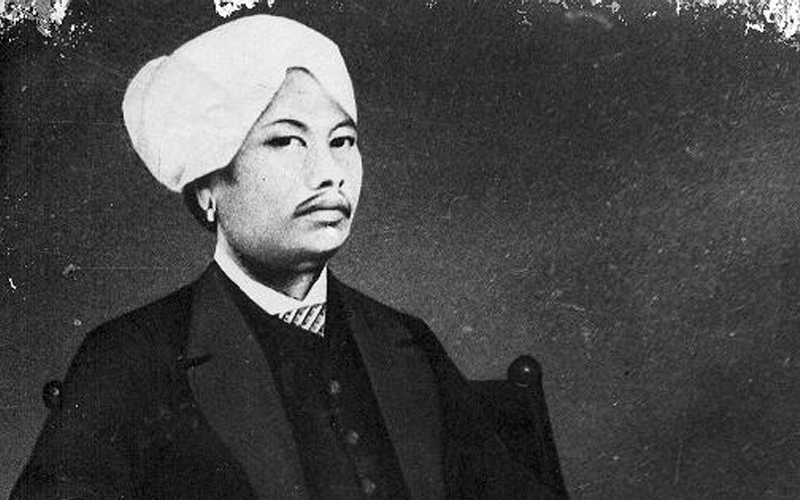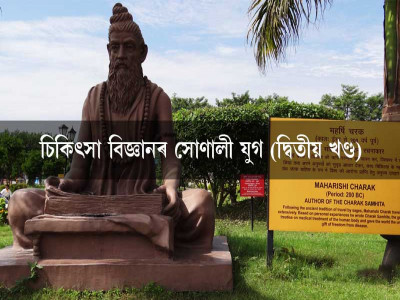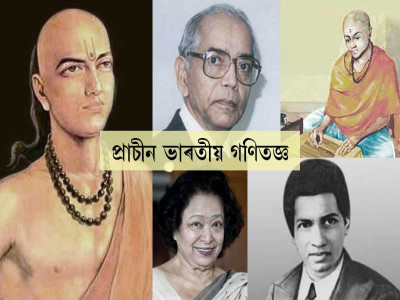
Our beloved Koireng
In the third quarter of the 19th century, the three prominent persons who took a decisive part in Manipur's politics were Senapati Tikendrajit, Thangal General, and Paona Brajabashi. They were patriots of the first order and laid down their lives to save their country from British domination.
Koireng, popularly known as Bir Tikendrajit, was one of the unforgettable nationalist figures of Manipur. He holds a unique position in India's freedom struggle. With the inborn nature of a patriot, he boldly defied the aggressive acts of the mighty British imperialist power. He was against imperialism and colonialism.
In short, he was a crusader who resisted the expansion of colonialism. He fearlessly fought against the colonialists. For his patriotism Tikendrajit is immortal. He has been called the "Lion of Manipur". Even the then government of British India had likened him to a fierce tiger.
Manipur had enjoyed sovereign status until it was occupied by the British in 1891. Through a long historical process, the British imperialists had established a strong foothold in Manipur. The internal crises and the seven years of its devastation (1819-1826) at the hands of Burma, caused the British to intervene in Manipur.
As an ally of Prince Gambhir Singh, it tasted victory over Burma in the First Anglo-Burmese War (1824 - 1826). As a result, Manipur recovered from the devastation and Gambhir Singh was made the titular king of Manipur.
The effective powers were in the hands of the Britishers. The king could not resist the British interference which was more pronounced in external matters. Their interference increased much more during the reign of Maharaja Surchandra Singh who succeeded his father Chandrakriti. The consequence was the Anglo-Manipuri war in 1891 and the British conquest of Manipur despite a strong resistance put up by its people and the active struggle of Tikendrajit, Paona Brajabasi, and others.
Being a member of the royal family, Tikendrajit was familiar with the English which enabled him to know about their attitude and innermost feelings towards the Manipur people. A prince-turned nationalist born on Saturday, the 29th December 1856, Tikendrajit was the fourth son of Maharaja Chandrakriti. Since childhood, he was a lover of freedom.
On the death of the Maharaja, on 20th May 1886, Surchandra, the eldest son, succeeded to the throne of Manipur. The other princes were appointed as heir-apparent, army general, and police chief. Later, on the death of Jhalakriti, Tikendrajit was appointed general of the army. But misunderstandings and tensions were created among the princes which ultimately led the royalty to split into two factions, one led by Tikendrajit and the others by Pakasana.
The tension continued to rise higher and higher over the king's negligence of the situation and British interference. Tikendrajit thought that the king was unduly favouring Pakasana. He could also not tolerate the attitude of the British. Maharaja Surchandra was unaware of the way the British usurped power from the local rulers to expand their colonial empire.
Tikendrajit got an idea as to their intentions and he tactfully made efforts to defend Manipur's sovereignty. He knew very well that the Britishers were eagerly awaiting an opportunity to transform sovereign Manipur into a British colony.
Hence, he and other like-minded princes-Angousan, Jilangamba, and others-revolted against the monarch on 22nd September 1890. This event is known as the "Palace Revolt" in the history of Manipur. The king fled away from the palace and took asylum in the British residency. Kullachandra and Tikendrajit became the king and heir-apparent respectively.
The ex-ruler left the residency for Calcutta informing Tikendrajit that he was going to Vrindavan. But on reaching Calcutta he petitioned the Government of India for restoration of his throne in Manipur.
After fully considering the matter the then Government of British India decided that Tikendrajit must be removed from Manipur and Kullachandra be recognised as the Maharaja of Manipur. It appointed its own chief commissioner in Manipur who announced the decision.
J.W. Quinton, the chief commissioner, reached Manipur with a troop of 500 soldiers. For this purpose, the royal brothers were invited to a "Durbar". But they were made to stand for long hours outside the Durbar Hall on a sunny day. In the meantime, the secret plan of arresting Tikendrajit had leaked out. The Durbar could not be held due to the absence of the Tikendrajit.
On the failure of their plan, Grimwood, the then British political agent in Manipur, conveyed to the king the decision and pressured him to hand over the heir-apparent to them. Ultimately, the English decided to use force as the king declined.
On the evening of March 24, 1891, the British troops attacked the Palace Compound, particularly Tikendrajit's residence, killing many innocents including women and children who were watching a cultural programme, Ras Lila.
The Manipur army succeeded in its offensive struggle. Five officers- Quinton, Grimwood, Lt. Col. Simpson, Cossins, and a bugler had to take shelter in the cellar. But the feeling of revenge among the people whose children, wives, and relatives had been killed, grew so high that they executed the five Britishers. This resulted in the Anglo-Manipuri War in 1891 and the annexation of Manipur by the British.
Major Maxwell took over as the chief political agent. The trials of Kullachandra and Tikendrajit and others were held by a court constituted by the then British Indian government. Kullachandra, Tikendrajit, and Thangal General were sentenced to death. However, the sentence on Kullachandra was commuted to transportation of life following his appeal to the government.
Queen Victoria made efforts to save Tikendrajit but failed. Despite her wish and strong protest of the people, he and Thangal General were hanged in an open place before the general public on August 13, 1891.
A protest movement launched by women at the very moment could not save the martyrs and Manipur. The Britishers knew that a nationalist like Tikendrajit was a stumbling hurdle in their colonial designs. In his absence, the transformation of Manipur into a British colony was inevitable.
The State of Manipur celebrates this day, August 13, as Patriot's Day to remember their role in the freedom struggle. Tikendrajit, indeed, was nationalist par excellence. The people of Manipur would always cherish him as a symbol against tyranny.
Disclaimer: The opinions expressed in this article are those of the author's. They do not purport to reflect the opinions or views of The Critical Script or its editor.

Newsletter!!!
Subscribe to our weekly Newsletter and stay tuned.

















Related Comments